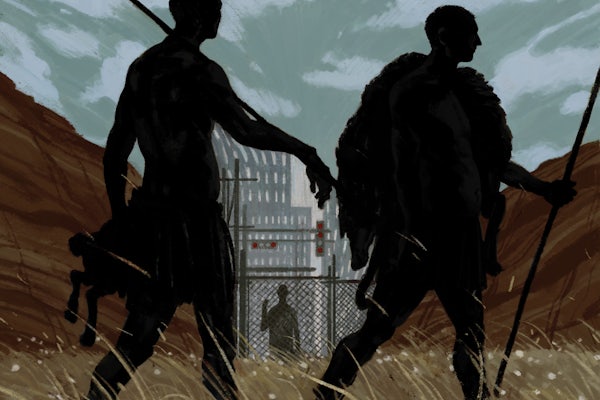by JEDEDIAH PURDY
 ILLUSTRATION/Hokyoung Kim
ILLUSTRATION/Hokyoung Kim
Four years before World War I shattered the empires of Europe, the Encyclopaedia Britannica predicted an indefinite age of peace and commercial prosperity. Published at the high-water mark of imperial self-confidence, the entry on “civilization” was particularly optimistic. Thanks to technology and moral enlightenment, the writers judged, an increasingly connected world was hurtling toward the age of “cosmopolite man,” who would enjoy leisure and freedom in a global community of equals. “When this ideal is attained,” the Encyclopaedia promised, “mankind will again represent a single family, as it did in the day when our primeval ancestors first entered on the pathway of progress.”
It was a long pathway, measured in millennia, but a straight one. The Encyclopaedia took its readers through a panorama of universal history, from “the lower status of savagery,” when hunter-gatherers first mastered fire; to the “middle status of barbarism,” when hunters learned to domesticate animals and became herders; to the invention of writing, when humanity “graduated out of barbarism” and entered history. Along the way, humans learned to cultivate grains, such as wheat and rice, which showed them “the value of a fixed abode,” since farmers had to stay near their crops to tend and harvest them. Once people settled down, “a natural consequence was the elaboration of political systems,” property, and a sense of national identity. From there it was a short hop—at least in Edwardian hindsight—to the industrial revolution and free trade. Some unfortunate peoples, even entire continents such as aboriginal North America and Australia, might fall off the Progress train and have to be picked up by kindly colonists; but the train ran along only one track, and no one would willingly decline to board it.
We pride ourselves today on having overcome such condescending myths. But James C. Scott, an eminent and iconoclastic political scientist, is not so sure that we have. In Against the Grain, Scott argues that we still think of our world as the fruit of a series of undeniable advances: domestication, public order, mass literacy, and prosperity. We chide the ancient Greeks for relying on enslaved labor and the Romans for their imperial wars, but our own story, as we imagine it, still starts with those ancient city-states and their precursors in the Mesopotamian Middle East (basically modern Iraq), when some clever primates first planted rows of seeds, built mud-brick walls, and scratched cuneiform on a crude tablet. In our own minds, we are the descendants of people who couldn’t wait to settle down.
The truth, Scott proposes, may be the opposite. What if early civilization was not a boon to humankind but a disaster: for health and safety, for freedom, and for the natural world? What if the first cities were, above all, vast technologies of exploitation by a small and rapacious elite? If that is where we come from, who are we now? What possibilities might we discover by tracing our origins to a different kind of ancestor?
New Republic for more